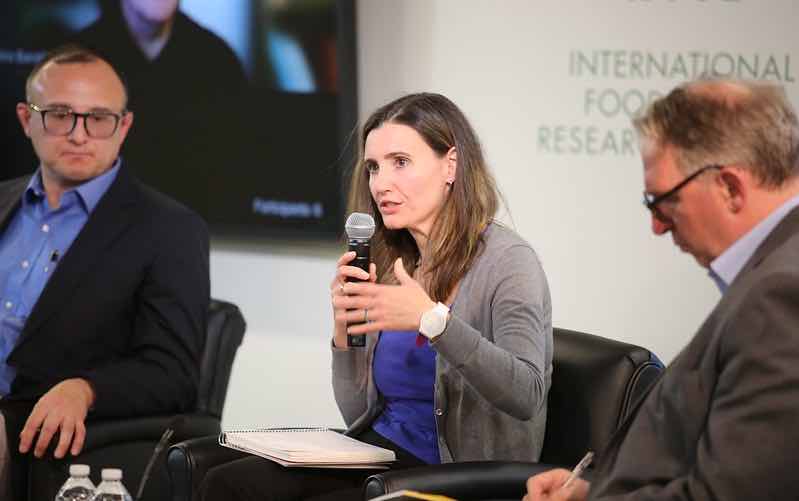The global food system, with its massive carbon footprint and large-scale impacts on ecosystems and public health, must be transformed to sustainably meet the world’s steadily growing demand for food in the coming decades. The Political Economy of Food System Transformation: Pathways to Progress in a Polarized World, a new book co-edited by IFPRI’s Danielle Resnick and Johan Swinnen and published jointly by IFPRI and Oxford University Press, explores the complex dynamics around this much-needed transformation.
A November 14 book launch event, which attracted a large audience from around the world, examined the book’s implications for current food system issues and ways to pursue meaningful food policy decision-making reforms in today’s increasingly polarized contexts.
Danielle Resnick, Senior Research Fellow at IFPRI, provided an overview of the book, drawing on insights from Chapter 1 and Chapter 15. She highlighted the importance of a multidisciplinary approach to this work. “We were very lucky to have 22 global scholars participate in this book using disparate methodologies, coming at political economy from different disciplinary perspectives to give us much more nuance on this topic,” she said.
“The food system is incredibly dynamic and complex,” Resnick observed, and a significant shift in perspective has occurred: “Traditionally when we were looking at political economy of agricultural policy, we thought in quite simplistic terms: Producers vs. consumers. Producers want higher prices; consumers want lower prices.” The current landscape is much more complex, with diverse players including insurance companies, banks, and even mining companies involved in fertilizer production. “We now have much more differentiation in the kinds of special interest groups and coalitions that we need to be thinking about,” said Resnick. She added that decision-making about food systems is occurring a context of increased populism and misinformation campaigns, fractured multilateralism, and ever-growing expectations about what food systems can, and should, achieve—including food sovereignty, racial justice, and gender equality.
Koen Deconinck, Economist in the Trade and Agriculture Directorate of the Organization for Economic Cooperation and Development (OECD), author of Chapter 2, explained how facts, interests, and values interact to shape the political economy around food system transformation. “Basically, all political problems boil down to disagreements over facts, interests, or values, either alone or in combination,” he said. Importantly, while there are best practices to address those disagreements such as regulatory impact assessments, scientific advice, and stakeholder consultation processes, success is never really guaranteed. “But to the extent that you are using those best practices and incorporating them into your policy process … you might reduce the risks of major policy controversies emerging,” he concluded.
Eduardo Gómez, Professor and Director of the Institute of Health Policy and Politics at Lehigh University, and author of Chapter 6, recounted how Mexico, India, and South Africa have devised policies to address a very sharp rise in non-communicable diseases, such as diabetes, linked to the consumption of ultra-processed foods and sugary beverages. In contrast to many developed countries including the United States, he said, those three emerging economies introduced national soda taxes and impactful public health awareness campaigns. However, he noted, most have still failed to introduce effective marketing, sales, and food labeling regulations.
Christopher Barrett, Professor at the Charles H. Dyson School of Applied Economics and Management at Cornell University, author of Chapter 9, noted that sound science and evidence are crucial to developing promising technological or institutional innovations for agrifood systems. However, “the real obstacle to agrifood systems transformation isn’t the [lack] of exciting scientific or engineering innovations,” Barrett said. “The real barrier to transformation lies in the political economy of diffusing those innovations and scaling them in context appropriate combinations. That really underscores the central thesis of this book—that is, that political economy issues are at the heart of the challenge of transforming agrifood systems.”
Johan Swinnen, IFPRI Director General, CGIAR Managing Director of Systems Transformation, and the book’s co-editor, discussed the history of agricultural transformation and challenges for the future. “A massive change in agricultural policy was accomplished over the last 50 years,” Swinnen said. In the 1970s and 1980s, he said, food and agricultural markets were significantly distorted by extensive taxation on farming in developing countries and by substantial subsidies in wealthier countries. While those distortions have since diminished—a critical change in agriculture and food policy globally—much remains to be done. “We still have a lot of subsidies in the world, but they are given in much less distortive ways, on average, than it used to be,” Swinnen said, adding that reducing taxes in developing countries “has had massive benefits for farmers and food security.” Swinnen also stressed the importance of looking at the entire food value chains, including processors, traders, retailers, and other stakeholders, not just producers and consumers, in addressing food system transformation and its political economy aspects.
Loraine Ronchi, CGIAR Senior Advisor for Policy Impact, offered her perspective on the book’s themes, indicating her appreciation of how clearly the book characterizes “the complexity of the current food system and the task of policy” in identifying the main drivers of change, rising trends, and new realities. The book’s structure provides a helpful approach, she said: “We have incentives for food system reform, mobilization for reform, the design of politically viable options and then adaptation of food system policies as things change … The book is organized in sections around these four policy driver groups, and all four sections offer a rich analysis and useful insights.”
The event concluded with an engaging Q&A session with the audience in the room and online, including questions about locally led climate adaptation, addressing local political economy issues, and the gender dimensions of the political economy of food system transformation.
To learn more, please watch the event recording and download a free copy of the book.
Jennifer Johnson is a Communications Specialist and Evgeniya Anisimova is Media & Digital Engagement Manager with IFPRI’s Communications and Public Affairs Unit.







